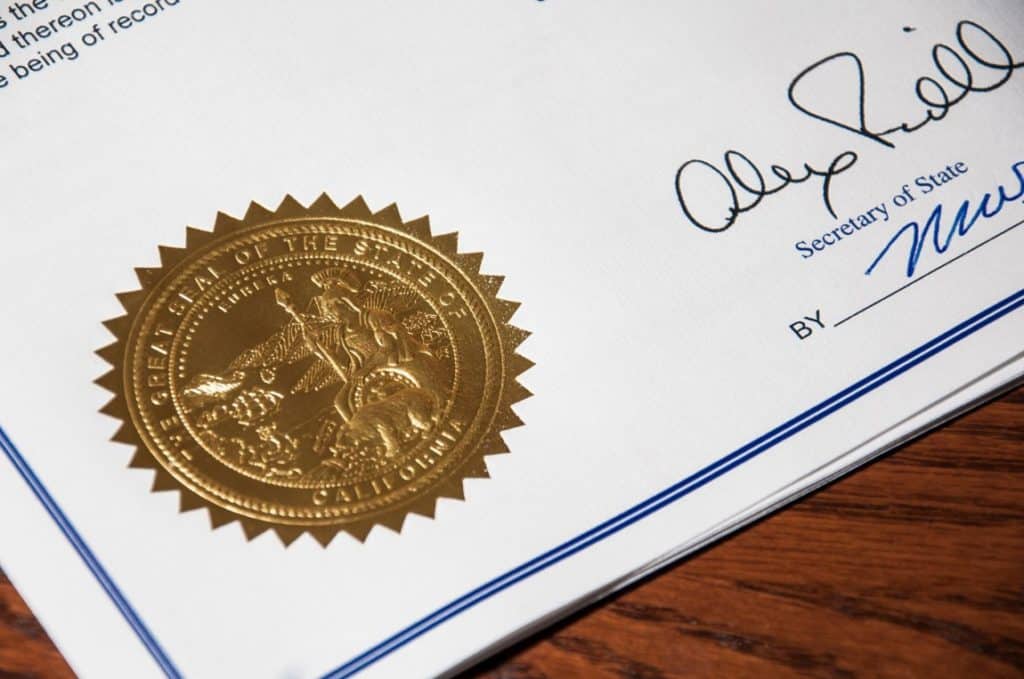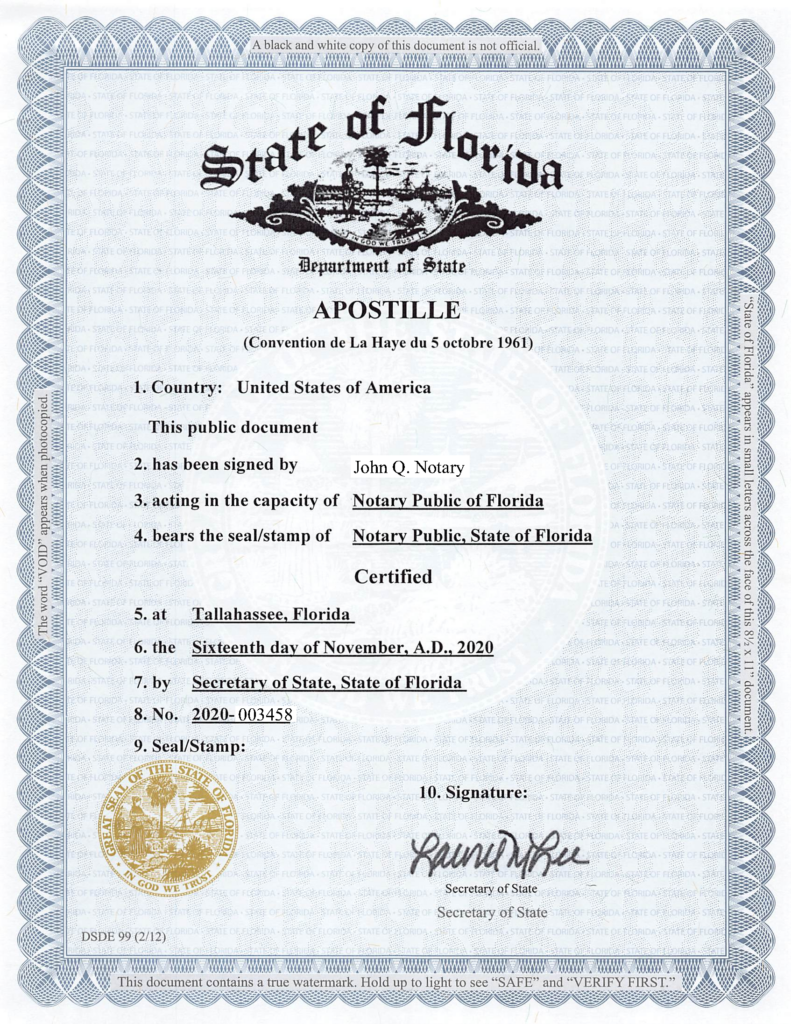Comprehending the Apostille Refine: A Comprehensive Overview to International Paper Verification
Navigating the detailed landscape of worldwide record verification can be daunting without a clear understanding of the apostille process. This guide thoroughly outlines the essential steps, from determining which files require certification to sending them for verification by the Competent Authority. Understanding the value of an apostille and identifying prospective challenges, such as insufficient entries and language obstacles, can dramatically streamline the verification journey. What specifically specifies an apostille, and why is it so important for papers destined for Hague Convention nations? These concerns develop the foundation of our expedition right into this necessary lawful procedure.
What Is an Apostille?
An apostille is a main certification that confirms the authenticity of a document for use in one more country. This certification, released by an assigned authority in the country where the paper came from, makes certain that the file is acknowledged as legitimate and reputable in the global arena. The procedure of obtaining an apostille involves a number of actions, including the confirmation of the paper's signatures, seals, and stamps by appropriate governmental bodies.
The apostille serves as a worldwide acknowledged type of authentication, implemented by the Hague Convention of 1961. This treaty, formally referred to as the Hague Convention Eliminating the Requirement of Legalisation for Foreign Public Records, standardizes the process of paper certification among participant nations. The apostille itself is a standard certificate which contains details information, such as the issuing authority, the country of origin, and the date of issuance.
It is essential to note that not all files are eligible for an apostille. Generally, public files like birth certifications, marriage licenses, court orders, and instructional diplomas get this qualification. Personal documents, such as agreements and agreements, might need notarization and additional steps to qualify.
Significance of Apostille
Comprehending what an apostille is establishes the phase for valuing its significance in worldwide dealings. houston tx apostille. An apostille, basically a form of accreditation provided by a marked authority, confirms the authenticity of a paper for usage in international nations that are signatures to the Hague Apostille Convention. This standard process eliminates the requirement for further legalisation by embassies or consular offices, thus simplifying global purchases
The relevance of an apostille can not be overstated. It guarantees the integrity and approval of important files-- such as copyright, marriage licenses, and educational diplomas-- across boundaries. For businesses, it helps with the smooth conduct of worldwide trade, mergings, and acquisitions by giving a trusted right here approach of document confirmation. This lowers governmental hurdles, saving both time and sources.
Additionally, an apostille enhances legal security and conformity. Governments and institutions can with confidence count on the credibility of files birthing an apostille, More about the author mitigating the danger of scams and misstatement. Thus, the apostille acts as an important device in promoting worldwide teamwork and trust fund. Its duty in promoting reliable and safe and secure international deals underscores its crucial worth in today's interconnected world.
Files That Require Apostille
When participating in global deals or lawful matters, certain files frequently require the verification provided by an apostille. This guarantees their acknowledgment and approval in nations that are signatories to the Hague Apostille Convention. Generally, personal files such as birth certifications, marital relationship certifications, and fatality certificates require an apostille, particularly when they are used for procedures like migration, marital relationship abroad, or global probate matters.
Educational documents are an additional group regularly needing apostilles. Diplomas, transcripts, and academic records often require this authentication for purposes such as seeking additional education, work, or professional licensing in an international country (houston tx apostille). This step guarantees that the documents are acknowledged as genuine and legitimate
Legal documents, including powers of attorney, affidavits, and court orders, also typically demand apostilles. Business records such as certifications of unification, bylaws, and business contracts may require an apostille to facilitate global trade, develop foreign branches, or take part in cross-border lawful process.
Actions to Get an Apostille

Obtaining an apostille entails a multi-step procedure that guarantees the credibility and acceptance of your records in foreign countries. The preliminary step is identifying which documents require an apostille. houston tx apostille. Typical files consist of birth certifications, marital relationship licenses, scholastic transcripts, and business files
As soon as recognized, the record must be certified by the suitable providing authority. This could involve registration by a notary public or confirmation by a regional or state authorities, depending on the kind of file. After accreditation, the document ought to be sent to the designated Competent Authority in the paper's country of origin. In the USA, for instance, this is usually the Secretary of State's workplace for each state.
The entry procedure generally needs a finished application, the initial file, and a charge. Some jurisdictions may offer the choice of expedited processing for an additional fee. Upon successful confirmation, the Competent Authority will certainly affix the apostille certificate to the file, consequently verifying its authenticity.
Typical Difficulties and Solutions
Browsing the apostille procedure can provide numerous typical obstacles that, if not correctly resolved, might delay this or complicate paper verification. Each country has particular needs for the types of documents that can be apostilled, and any type of variance from these can result in rejection.
Another common difficulty is recognizing the different processing times. Processing times can differ significantly between nations and also in between different regions within the very same country. It is vital to represent these variations when planning the apostille process to avoid unanticipated delays.
Additionally, language obstacles can position substantial barriers. Documents in a foreign language usually require qualified translations, and any kind of mistakes in translation can lead to additional problems. Involving a specialist translation service can reduce this risk.

Final Thought
Mastering the apostille procedure substantially improves the effectiveness of international record verification. By understanding the need of determining and licensing needed records, and navigating the entry to the Competent Authority, the procedure ends up being a lot more manageable. Understanding of common challenges, such as insufficient entries and language obstacles, further help in avoiding potential hold-ups. Making certain files are properly apostilled facilitates their acceptance in Hague Convention signatory nations, thus supporting seamless international lawful and management treatments.